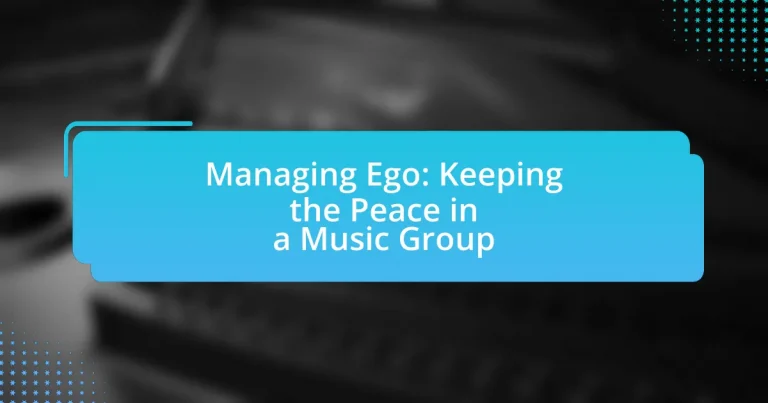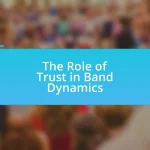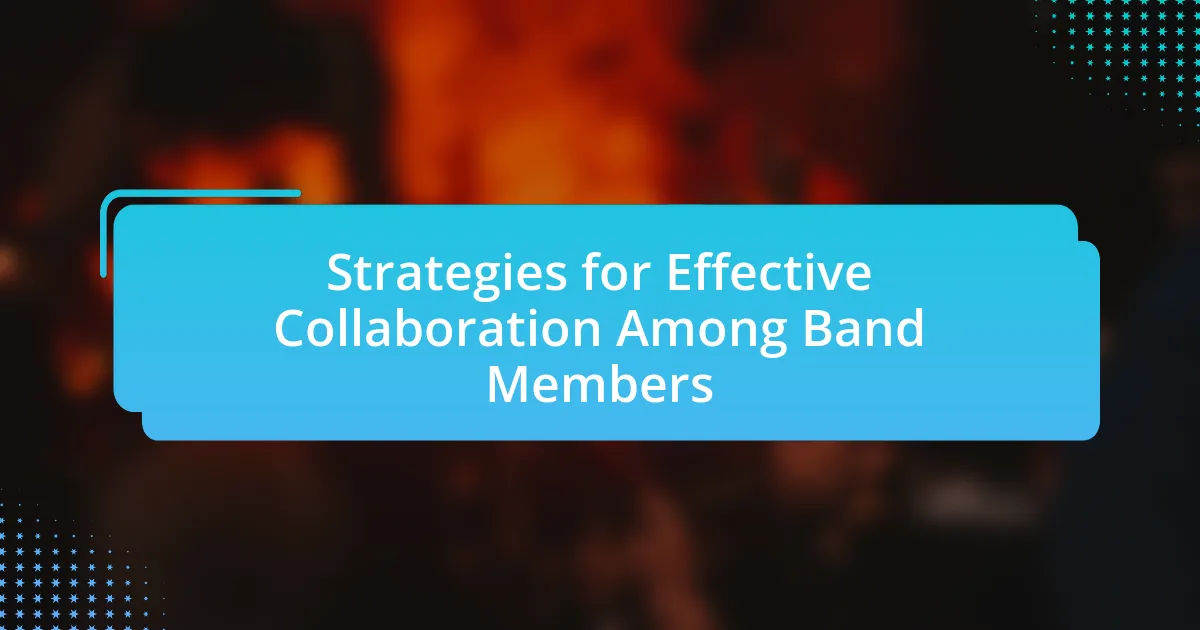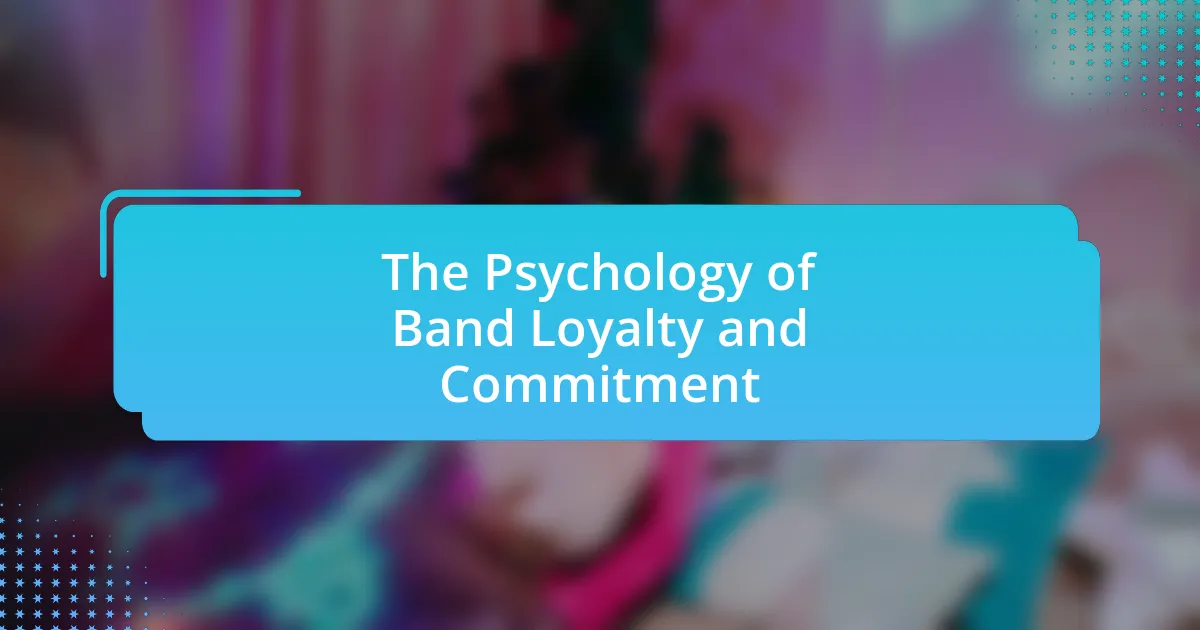The article focuses on managing ego within music groups, emphasizing the importance of balancing individual personalities and ambitions to foster collaboration and harmony. It outlines how unchecked egos can disrupt group dynamics, leading to conflicts, reduced creativity, and high turnover rates. Key strategies for effective ego management include open communication, establishing shared goals, and implementing regular feedback sessions. The article also highlights the role of leadership in setting a positive tone and the long-term effects of poor ego management on group cohesion and performance.
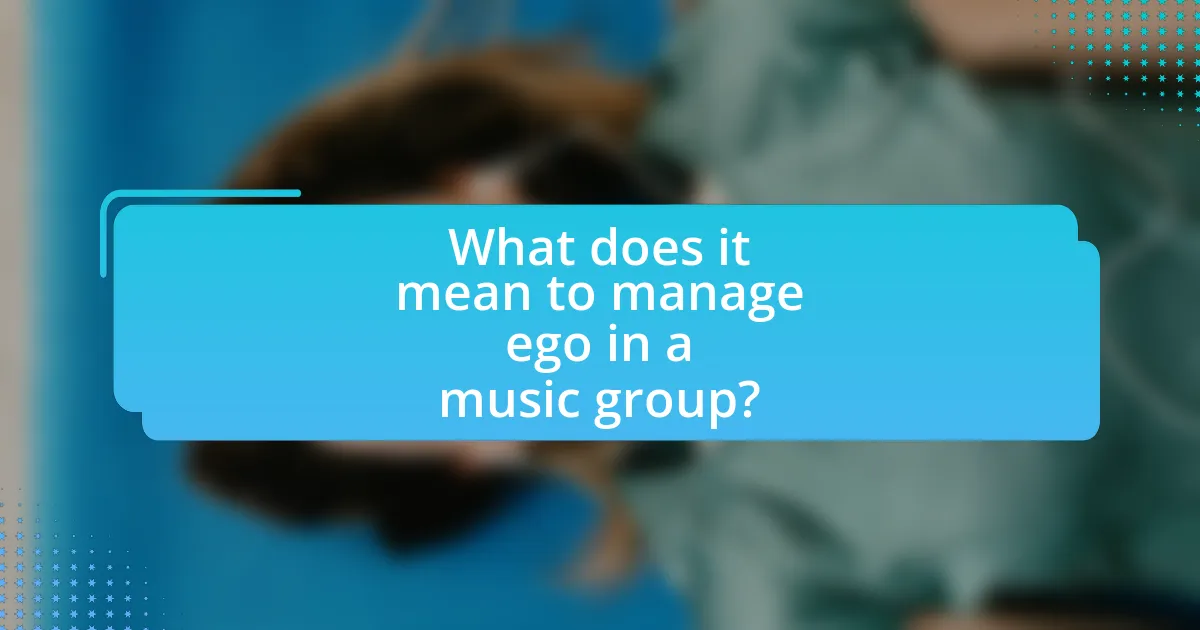
What does it mean to manage ego in a music group?
Managing ego in a music group means balancing individual personalities and ambitions to foster collaboration and harmony. In a music group, members often have strong creative identities and differing opinions, which can lead to conflicts if egos are not managed effectively. Successful management involves open communication, establishing shared goals, and creating an environment where all members feel valued and heard. This approach helps prevent power struggles and promotes teamwork, ultimately enhancing the group’s creative output and cohesion.
Why is ego management important in a collaborative environment?
Ego management is important in a collaborative environment because it fosters effective communication and teamwork. In settings like music groups, where creativity and personal expression are vital, unchecked egos can lead to conflicts, hinder collaboration, and stifle innovation. Research indicates that teams with high emotional intelligence, which includes ego management, perform better and are more cohesive. For instance, a study published in the Journal of Applied Psychology found that teams with members who effectively manage their egos experience higher levels of trust and cooperation, leading to improved outcomes. Thus, managing ego is essential for maintaining harmony and productivity in collaborative settings.
How can unchecked egos disrupt group dynamics?
Unchecked egos can disrupt group dynamics by fostering conflict, reducing collaboration, and undermining trust among members. When individuals prioritize their self-importance over the collective goals, it leads to power struggles and resentment, which can stifle creativity and hinder effective communication. Research indicates that teams with high levels of ego-driven behavior experience decreased performance and morale, as members may feel undervalued or ignored. For instance, a study published in the Journal of Applied Psychology found that ego clashes within teams can lead to increased turnover rates and lower overall satisfaction, demonstrating the detrimental impact of unchecked egos on group cohesion and productivity.
What are the signs of ego-related conflicts in a music group?
Signs of ego-related conflicts in a music group include frequent disagreements over creative direction, lack of collaboration, and increased tension during rehearsals or performances. These conflicts often manifest as members prioritizing personal recognition over group success, leading to a breakdown in communication. For instance, when one member consistently interrupts others or dismisses their ideas, it indicates an imbalance in respect and collaboration. Additionally, if members exhibit passive-aggressive behavior or avoid discussing issues directly, it further signifies underlying ego conflicts. Research shows that such dynamics can hinder group cohesion and overall performance quality, as highlighted in studies on team dynamics in collaborative environments.
What are the common sources of ego in music groups?
Common sources of ego in music groups include individual talent recognition, creative differences, and competition for leadership roles. Individual talent recognition often leads members to feel superior based on their contributions, which can create tension. Creative differences arise when members have conflicting artistic visions, leading to disputes over direction and ownership of ideas. Competition for leadership roles can foster rivalry, as members vie for influence and recognition within the group. These dynamics are frequently observed in successful bands, where the interplay of personal ambition and collaborative efforts can either enhance or disrupt group cohesion.
How do individual backgrounds influence ego in group settings?
Individual backgrounds significantly influence ego in group settings by shaping perceptions, communication styles, and conflict resolution approaches. For instance, individuals from collectivist cultures may prioritize group harmony over personal recognition, leading to a more subdued ego in collaborative environments. Conversely, those from individualistic backgrounds might exhibit a stronger ego, seeking personal validation and recognition, which can lead to competition and conflict within the group. Research by Hofstede (1980) on cultural dimensions highlights these differences, showing that cultural background directly impacts interpersonal dynamics and ego expression in group contexts.
What role does success play in shaping ego among group members?
Success significantly influences the ego of group members by enhancing their self-esteem and sense of identity within the group. When a music group achieves success, such as a hit song or a sold-out concert, individual members often experience a boost in their perceived value and contributions to the collective effort. This elevation in ego can lead to increased confidence, but it may also result in competition and conflict if members begin to prioritize personal recognition over group cohesion. Research indicates that success can create a hierarchy within groups, where those who contribute more to the success may feel entitled to greater recognition, potentially leading to tension among members. For instance, a study published in the Journal of Personality and Social Psychology found that individuals often derive their self-worth from group achievements, which can exacerbate ego-related issues if not managed properly.
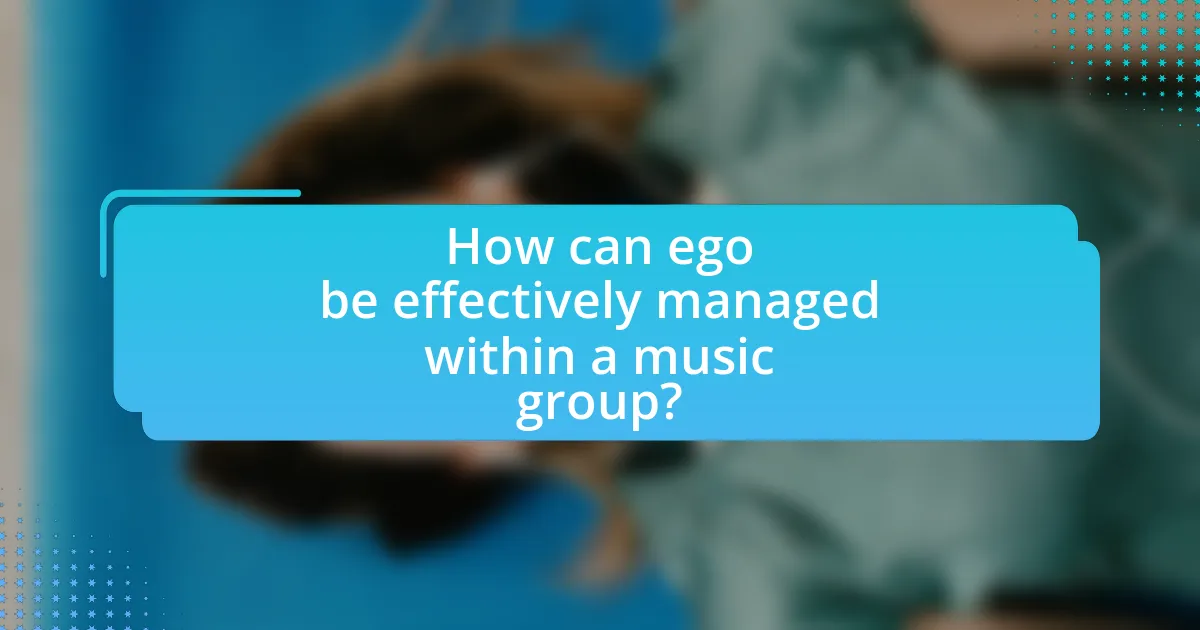
How can ego be effectively managed within a music group?
Ego can be effectively managed within a music group by fostering open communication and establishing clear roles. Open communication allows members to express their thoughts and feelings, reducing misunderstandings that can lead to ego clashes. Establishing clear roles ensures that each member understands their contributions and responsibilities, minimizing competition and promoting collaboration. Research indicates that groups with defined roles and strong communication practices experience higher levels of satisfaction and lower conflict rates, as seen in studies on team dynamics in collaborative environments.
What strategies can be employed to keep egos in check?
To keep egos in check within a music group, implementing open communication and regular feedback sessions is essential. Open communication fosters an environment where members feel valued and heard, reducing the likelihood of ego clashes. Regular feedback sessions allow for constructive criticism and acknowledgment of each member’s contributions, promoting collaboration over competition. Research indicates that teams with high levels of communication and feedback report better cohesion and lower interpersonal conflicts, which supports the effectiveness of these strategies in managing egos.
How can open communication mitigate ego-related issues?
Open communication can mitigate ego-related issues by fostering an environment of trust and understanding among group members. When individuals express their thoughts and feelings openly, it reduces misunderstandings and allows for collaborative problem-solving. Research indicates that teams with high levels of communication report lower levels of conflict and higher satisfaction, as seen in a study published in the Journal of Applied Psychology, which found that effective communication significantly correlates with team cohesion and performance. By addressing concerns directly and constructively, open communication helps to defuse potential ego clashes, leading to a more harmonious and productive group dynamic.
What techniques can be used to foster a collaborative spirit?
To foster a collaborative spirit in a music group, techniques such as open communication, shared goals, and team-building activities can be employed. Open communication encourages members to express their ideas and concerns, which builds trust and understanding. Establishing shared goals aligns the group’s efforts and fosters a sense of unity, as seen in successful bands that prioritize collective objectives over individual ambitions. Team-building activities, such as collaborative songwriting sessions or group rehearsals, enhance interpersonal relationships and create a supportive environment, which is crucial for maintaining harmony within the group.
How can leadership influence ego management in a music group?
Leadership can significantly influence ego management in a music group by establishing a collaborative environment that prioritizes group goals over individual ambitions. Effective leaders foster open communication, encourage mutual respect, and set clear expectations, which helps mitigate conflicts arising from personal egos. For instance, research by the Journal of Music Therapy indicates that strong leadership can enhance group cohesion and reduce competitive tensions, leading to a more harmonious working atmosphere. By modeling humility and promoting shared achievements, leaders can effectively manage individual egos, ensuring that the collective creativity of the group thrives.
What qualities should a leader possess to manage egos effectively?
A leader should possess emotional intelligence, strong communication skills, and conflict resolution abilities to manage egos effectively. Emotional intelligence allows leaders to understand and empathize with the feelings of group members, fostering a supportive environment. Strong communication skills enable leaders to articulate expectations clearly and facilitate open dialogue, which helps in addressing misunderstandings. Conflict resolution abilities are crucial for navigating disputes that arise from differing egos, ensuring that issues are resolved constructively. Research indicates that teams with emotionally intelligent leaders report higher satisfaction and collaboration, highlighting the importance of these qualities in maintaining harmony within a music group.
How can leaders set the tone for a healthy group dynamic?
Leaders can set the tone for a healthy group dynamic by fostering open communication and establishing clear expectations. By encouraging team members to express their thoughts and feelings, leaders create an environment where everyone feels valued and heard. Research indicates that effective communication enhances collaboration and reduces misunderstandings, which are crucial in a music group setting where creativity and teamwork are essential. Additionally, leaders should model positive behaviors, such as respect and empathy, which can influence group members to adopt similar attitudes, thereby reinforcing a supportive atmosphere.
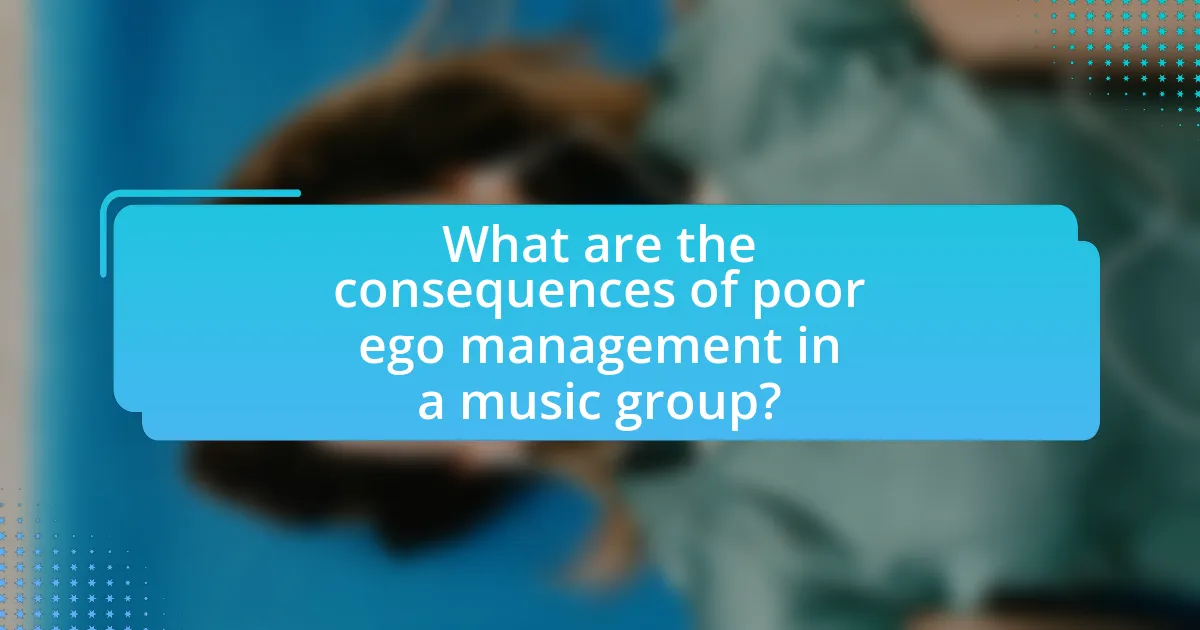
What are the consequences of poor ego management in a music group?
Poor ego management in a music group can lead to significant interpersonal conflicts and decreased group cohesion. When individual egos are not managed effectively, members may experience heightened competition, resulting in resentment and a lack of collaboration. This can manifest in reduced creativity, as members may be less willing to share ideas or support one another, ultimately hindering the group’s artistic output. Additionally, poor ego management can lead to high turnover rates, as members may leave due to unresolved conflicts or a toxic environment. Research indicates that groups with strong interpersonal relationships and effective conflict resolution strategies tend to perform better, highlighting the importance of managing egos for overall success.
How can unresolved ego conflicts impact group performance?
Unresolved ego conflicts can significantly hinder group performance by creating a toxic environment that stifles collaboration and communication. When individuals prioritize their personal agendas over group objectives, it leads to decreased trust and increased tension among members. Research indicates that teams experiencing unresolved conflicts often face reduced productivity, as members may become more focused on defending their positions rather than working towards common goals. For instance, a study published in the Journal of Applied Psychology found that teams with high levels of interpersonal conflict had a 30% decrease in performance metrics compared to those with effective conflict resolution strategies. This evidence underscores the detrimental effects of unresolved ego conflicts on group dynamics and overall performance.
What are the long-term effects of ego clashes on group cohesion?
Ego clashes can significantly undermine group cohesion over the long term by fostering distrust and resentment among members. When individuals prioritize their personal agendas over collective goals, it leads to fragmentation within the group, reducing collaboration and communication. Research indicates that teams experiencing frequent ego conflicts often see a decline in overall performance and morale, as members become more focused on individual recognition rather than shared success. For instance, a study published in the Journal of Applied Psychology found that teams with high levels of interpersonal conflict exhibited lower levels of trust and commitment, which are critical components of effective group cohesion.
How can ego-related issues lead to member turnover?
Ego-related issues can lead to member turnover by creating conflicts and dissatisfaction within the group. When individuals prioritize their own interests or recognition over collective goals, it can result in interpersonal tensions, reduced collaboration, and a toxic environment. Research indicates that high levels of ego can diminish group cohesion, as members may feel undervalued or unappreciated, prompting them to leave the group. For instance, a study published in the Journal of Applied Psychology found that teams with high ego conflict experienced a 30% increase in turnover rates compared to those with lower levels of conflict. This demonstrates that unchecked ego can significantly impact member retention in collaborative settings like music groups.
What lessons can be learned from successful music groups?
Successful music groups demonstrate the importance of collaboration and effective communication in managing individual egos. These groups often prioritize collective goals over personal ambitions, fostering a sense of unity that enhances creativity and productivity. For instance, The Beatles, despite their individual talents, thrived by balancing their distinct styles and perspectives, which contributed to their groundbreaking music. Additionally, successful groups frequently establish clear roles and responsibilities, ensuring that each member feels valued while minimizing conflicts. This approach is evident in bands like U2, where each member’s contributions are recognized, leading to sustained harmony and success.
How have famous bands navigated ego challenges?
Famous bands have navigated ego challenges by implementing clear communication strategies and establishing collaborative decision-making processes. For instance, The Beatles faced significant ego clashes, particularly between John Lennon and Paul McCartney, which they managed by involving producer George Martin in discussions to mediate and facilitate compromise. Similarly, Fleetwood Mac dealt with personal conflicts during the recording of “Rumours” by creating a structured environment where each member could express their feelings while focusing on the collective goal of producing an album. These approaches demonstrate that successful bands often prioritize group cohesion and mutual respect to mitigate ego-related issues.
What best practices can emerging artists adopt from established groups?
Emerging artists can adopt collaboration, clear communication, and conflict resolution strategies from established groups. Collaboration fosters a sense of unity and shared purpose, which is essential for creative synergy. Established groups often emphasize clear communication to ensure that all members are aligned on goals and expectations, reducing misunderstandings. Additionally, effective conflict resolution techniques, such as active listening and compromise, help maintain harmony within the group. These practices are supported by research indicating that successful music groups prioritize interpersonal relationships and group dynamics, leading to enhanced creativity and productivity.
What practical tips can help manage ego in a music group?
To manage ego in a music group, establish clear communication and set collective goals. Clear communication fosters understanding and reduces misunderstandings that can lead to ego clashes. Setting collective goals ensures that all members are aligned and focused on a shared vision, which minimizes individual ego-driven agendas. Research indicates that groups with defined objectives experience higher cohesion and lower conflict, as seen in studies on team dynamics in collaborative environments.
How can regular feedback sessions improve group dynamics?
Regular feedback sessions can significantly enhance group dynamics by fostering open communication and trust among members. These sessions create a structured environment where individuals can express their thoughts and concerns, leading to increased collaboration and reduced misunderstandings. Research indicates that teams that engage in regular feedback are 25% more productive, as they can address issues promptly and adapt their strategies effectively. Furthermore, consistent feedback helps to align individual goals with group objectives, promoting a sense of shared purpose and accountability. This alignment is crucial in creative settings, such as music groups, where collaboration is essential for success.
What role does team-building play in ego management?
Team-building plays a crucial role in ego management by fostering collaboration and reducing individual competition within a group. Effective team-building activities create an environment where members feel valued and understood, which helps mitigate ego clashes that can arise from personal insecurities or ambitions. Research indicates that cohesive teams, formed through structured team-building exercises, experience lower levels of conflict and higher levels of trust, leading to improved communication and collaboration. For instance, a study published in the Journal of Applied Psychology found that teams with strong interpersonal relationships are more likely to manage conflicts constructively, thereby maintaining harmony and focus on collective goals.












